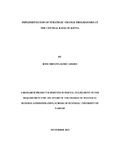| dc.description.abstract | The environment in which organizations operate in is ever changing and for survival hence organizations ought to develop and implement various strategies geared towards survival in a turbulent environment and to increase their competitiveness. Various models of change management have been developed by various scholars: they include Lewin’s (1947) three step model of change, Kotter’s (1996) eight-step model, Kanter et. al (1992) model of change management, Bullock & Battern (1985) four-phase model of planned change and Senge’s (1990) learning organizational model. The objective of the study was to establish the implementation of strategic change programmes at the CBK and evaluate the process used in the implementation of these changes. The findings concluded that the need for strategic change at CBK was necessitated by the bank’s quest to facilitate its workforce, fulfil their strategic objective of being a world class Central Bank to meet the demands of their stakeholders, the market environment, and be able to fulfill its mandate as a main regulator. The research was conducted through a case study where qualitative research for data collection was applied. Primary data was obtained through personal interviews using an interview guide which was administered to select member of the Bank in key strategic areas. Use was also made of other available Secondary data that was obtained from various periodic journals, weekly Bulletins, previous questionnaires used during the various change implementation initiatives, CBK Strategic plan and various reports obtained from the intranet and the communication channels of the organization. The data collected was summarized according to the study theme being strategic change implementation and the factors influencing implementation of strategic change programmes and analyzed using content analysis. A detailed interview guide was undertaken in support of this project and it identified the existence of three common themes which were also observed during the review of literature (Leadership, Culture and Communication). Finally the enactment of the constitution of Kenya 2010 remains the greatest force for the change in the CBK due to various provisions which required changes to be implemented to ensure the Constitution fulfils its Mandate. | en |

